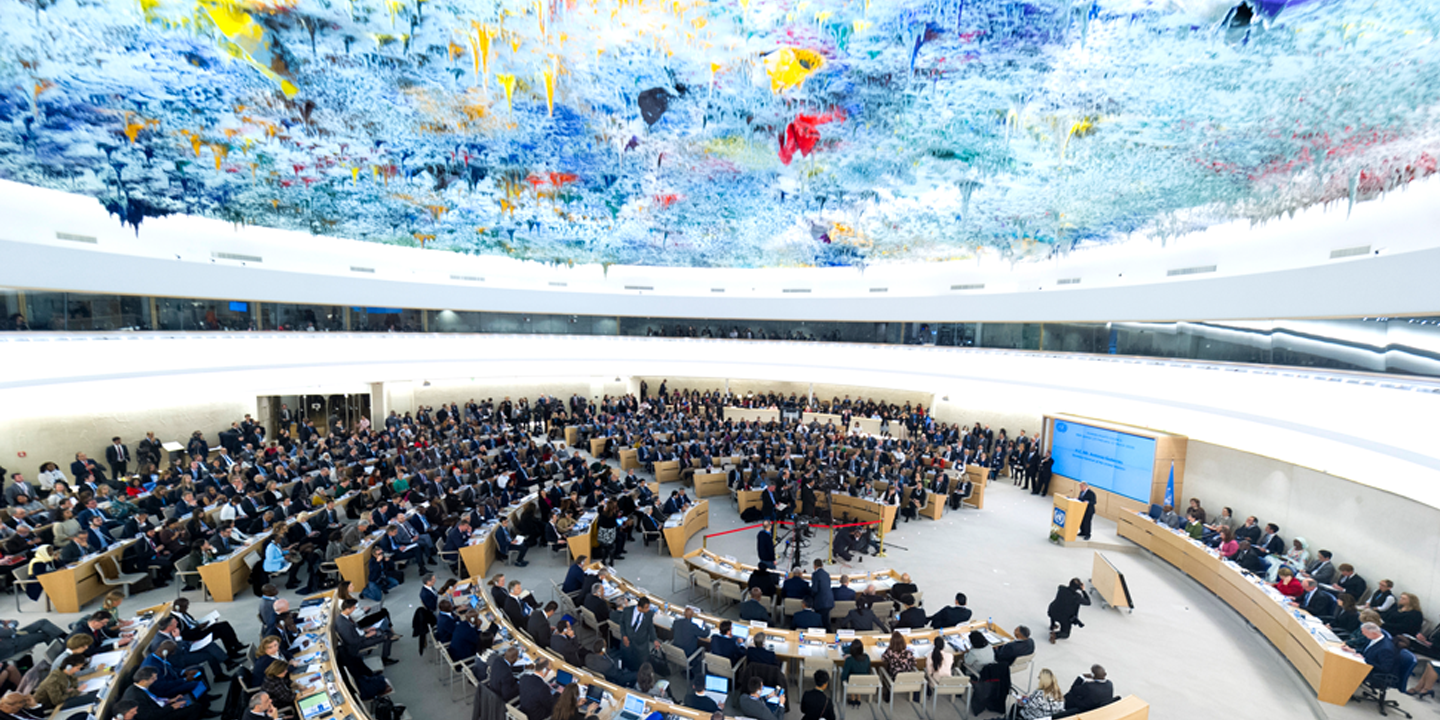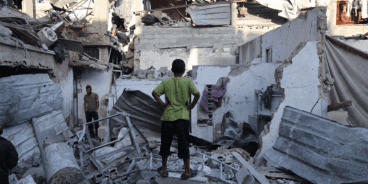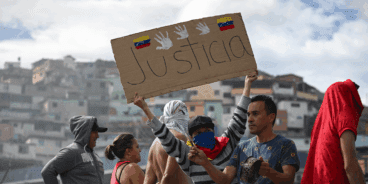

Eritrea: Adopt a strong resolution extending the Special Rapporteur’s mandate
To Permanent Representatives of Member and Observer States of the United Nations (UN) Human Rights Council (Geneva, Switzerland)
Excellencies,
Ahead of the UN Human Rights Council’s 59th session (16 June-11 July 2025), we, the undersigned non-governmental organisations, are writing to urge your delegation to support the development and adoption of a strong resolution that extends the mandate of the Special Rapporteur on the situation of human rights in Eritrea.
This year’s resolution should decisively move away from a “procedural” approach. In addition to extending the Rapporteur’s mandate, it should clearly spell out and condemn the ongoing grave human rights violations committed by Eritrean authorities in a context of widespread impunity.
~ ~ ~
Since 2019, when Djibouti and Somalia, the traditional co-sponsors of Eritrea-focused resolutions, discontinued their leadership and a group of states (and later the European Union) took over the initiative, Council resolutions on Eritrea have been short and procedural. Resolutions adopted from 2019 to 2024 focused mostly on extending the Special Rapporteur’s mandate. They failed to adequately reflect the grave human rights violations committed by Eritrean authorities.
We draw your attention to the violations mentioned in civil society letters issued in 2023 and 2024, ahead of the Council’s 53rd and 56th sessions, respectively. These violations, which are ongoing, include among others arbitrary arrests and detentions, including incommunicado detention of journalists, dissenting voices and religious adherents; violations of the rights to a fair trial, access to justice, and due process; torture and other cruel, inhuman or degrading treatment or punishment; enforced disappearances; conscription into the country’s abusive national service system and associated violations; violations of economic, social and cultural rights; and severe restrictions on fundamental freedoms, leading to a total closure of civic space in the country.
We further draw your attention to the 2016 findings of the Commission of Inquiry (COI) on Human Rights in Eritrea that there are “reasonable grounds to believe” that crimes against humanity have been committed in the country since 1991 and that Eritrean officials have committed and continue to commit the crimes of enslavement, imprisonment, enforced disappearance, torture, other inhumane acts, persecution, rape, and murder. No adequate follow-up has been mandated by the Council to date. In the meantime, Eritrea’s human rights situation has not fundamentally changed since the completion of the COI’s work and despite reports by successive Special Rapporteurs and the Office of the UN High Commissioner for Human Rights (OHCHR) on ongoing violations, no Eritrean official has been held accountable for these crimes. Impunity for past and ongoing human rights violations remains widespread.
Eritrean authorities did not seize the opportunity of the country’s membership in the Council (2019-2024) to improve the domestic human rights situation. Rather, they refused to engage in a serious dialogue with the international community and to cooperate with the Council’s mechanisms. Similarly, calls on Eritrea by the African Commission on Human and Peoples’ Rights (ACHPR) to, among others, release detainees (including 18 journalists detained since 2001), guarantee the right to a fair trial, initiate legal reform, guarantee the right to participate in public affairs, uphold freedoms of opinion, expression, peaceful assembly and association, and protect economic, social and cultural rights and the rights of women, remain unheeded.
It is critical for the Human Rights Council to produce a substantive assessment of Eritrea’s human rights situation. In addition to all the domestic issues addressed in pre-2019 resolutions, COI and Special Rapporteur reports, and successive civil society letters, the next Council resolution should address:
- The impact of Eritrea’s domestic situation abroad, including severe and far-reaching effects on the diaspora, who often face extraterritorial attacks aimed at maintaining control, silencing dissent and discouraging criticism of the authorities.
The Special Rapporteur has addressed such attacks as “transnational repression” and it is important that this aspect is included in Council resolutions. Eritrean embassies and consulates continue to require the payment of the so-called “2% (diaspora) tax” and the signature of a “regret” or “repentance” form to access consular services.
As the Special Rapporteur highlighted, violent incidents and clashes between government supporters and detractors, including around so-called cultural “festivals” (with movements of young Eritreans seeking to disrupt these events), “must be understood in the context of a complete lack of civic space and any avenues for Eritreans to participate in decision-making in their own country, [as] a large percentage of [Eritreans in the diaspora] are victims of human rights violations, [and in the face of] increased pressure from the Eritrean diplomatic and consular services.”
- The need to ensure adequate follow-up to the Council’s action on Eritrea so far.
In addition to the need to continue monitoring and reporting, the Special Rapporteur should be mandated, as part of his next report, to present an assessment of the evolution of Eritrea’s human rights situation in the context of the ten-year anniversary of the first report of the COI on Eritrea and include a stocktaking of accountability options and processes available to address past and ongoing violations. This may include updating the COI’s work through documentation and evidence collection.
~ ~ ~
As regional tensions are mounting, raising concerns about another round of armed conflict in the Horn of Africa, the Council should operationalise its prevention mandate through further action on Eritrea that provides some measure of deterrence through adequate scrutiny of the country’s human rights situation.
At its 59th session, the Council should adopt a resolution that:
-
-
- Extends the mandate of the Special Rapporteur on Eritrea;
-
-
-
- Urges Eritrea to cooperate fully with the Special Rapporteur, including by granting him access to the country;
-
-
-
- Condemns the ongoing grave human rights violations committed by Eritrean authorities in a context of widespread impunity, including in the context of extraterritorial attacks; and
-
-
-
- Requests:
-
-
-
- The High Commissioner and the Special Rapporteur to present updates on human rights in Eritrea at the Council’s 61st session in an enhanced interactive dialogue that includes the participation of civil society;
-
-
-
- The Special Rapporteur to present a comprehensive written report at the Council’s 62nd session and to the General Assembly at its 80th session; and
-
-
-
- The Special Rapporteur to incorporate in his next report an assessment of the evolution of Eritrea’s human rights situation in the context of the ten-year anniversary of the first report of the COI on Eritrea and include a stocktaking of accountability options and processes available to address past and ongoing violations and update of the COI’s work through follow-up documentation and evidence collection.
-
We thank you for your attention to these pressing issues and stand ready to provide your delegation with further information.
Sincerely,
1. AfricanDefenders (Pan-African Human Rights Defenders Network)
2. The America Team for Displaced Eritreans
3. Amnesty International
4. Burkinabè Human Rights Defenders Coalition (CBDDH)
5. Burundian Human Rights Defenders Coalition (CBDDH)
6. Cairo Institute for Human Rights Studies (CIHRS)
7. CIVICUS
8. Coalition of Human Rights Defenders-Benin (CDDH-Bénin)
9. Committee to Protect Journalists (CPJ)
10. CSW (Christian Solidarity Worldwide)
11. DefendDefenders (East and Horn of Africa Human Rights Defenders Project)
12. Egyptian Initiative for Personal Rights (EIPR)
13. Eritrea Focus
14. Eritrean Movement For Democracy and Human Rights (EMDHR)
15. Foundation Human Rights for Eritreans
16. Global Centre for the Responsibility to Protect (GCR2P)
17. Human Rights Concern – Eritrea (HRCE)
18. Human Rights Foundation
19. Human Rights Watch
20. Institut des Médias pour la Démocratie et les Droits de l’Homme (IM2DH) – Togo
21. International Bar Association’s Human Rights Institute (IBAHRI)
22. International Commission of Jurists (ICJ)
23. Ivorian Human Rights Defenders Coalition (CIDDH)
24. Lawyers’ Rights Watch Canada
25. Mouvement Y en a marre – Senegal
26. Network of Human Rights Defenders in Central Africa (REDHAC)
27. Nigerien Human Rights Defenders Network (RNDDH)
28. Raoul Wallenberg Centre for Human Rights
29. Reporters Without Borders (RSF)
30. Togolese Human Rights Defenders Coalition (CTDDH)
31. West African Human Rights Defenders Network (ROADDH/WAHRDN)
32. World Organisation Against Torture (OMCT)
Related Content


Atrocity Alert No. 455: Israel and the Occupied Palestinian Territory, South Sudan and Ethiopia
